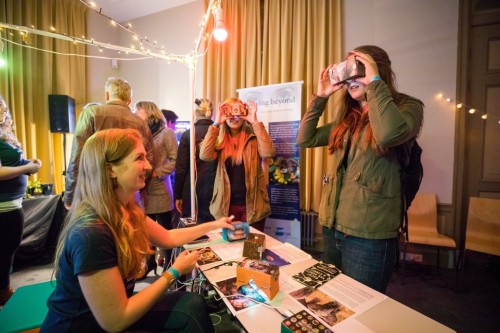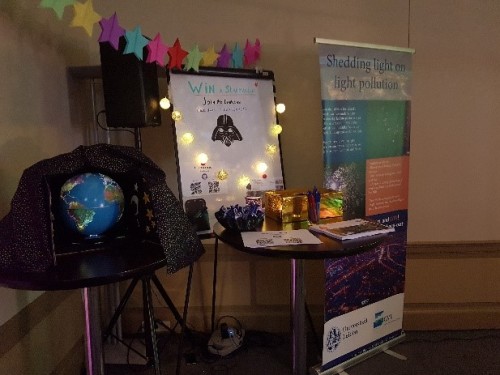Team members from Leiden University participated in the “Night of Arts & Science”, on the 16th of September in Leiden. Together with other staff members from the CML, Joris Timmermans, Leon Hauser, and Amie Corbin created “Viewing Beyond”. Using remote sensing technology in several interactive exhibits, they opened the visitors their eyes and let them view beyond the capabilities of the human eye.
Team member Esther Philips: ‘Considering that for most people remote sensing is probably quite unknown, we agreed that it would be really interesting to bring this emerging technology to the masses.’
Using cardboard VR glasses, people could experience how animals see the world. With their left eye, they saw as a human and with their right eye as another animal species, like a bee, a shark, or an eagle. The visitors explored a world that is usually hidden from human eyes.
With a living experiment, visitors observed how remote sensing technology works. Using spectrometers, the reflected light from different types of plants was measured and broadcasted live on a screen. The visitors learned how different plants and different conditions, like varying moisture content or a nitrogen deficiency, yield different outputs.
To discover the various possibilities of remote sensing research, some examples were shown in a slideshow on a screen. For example, how thermal imagery was used to map hurricane Irma and night observations are used to monitor the world light pollution. This last subject was further explained in the final part of the experience.
To make people aware of light pollution, people could see the light pollution on a special nighttime globe. Also, visitors could ‘join the dark side’ and contribute to citizen science projects on light pollution. One of these was created for the festival. Visitors could download a lux meter app and search for the darkest spot in the botanical gardens. By handing in their data they could win a price.

With Viewing Beyond visitors viewed the world beyond their eyes and shared and discussed their experiences and views on research with scientists. This expanded the knowledge of both the visitors as the participating scientists, hopefully leading to a brighter future with darker nights.
In the news: https://www.universiteitleiden.nl/en/news/2017/09/traveling-into-space-and-back-again
